- Home
- Sam Savage
An Orphanage of Dreams
An Orphanage of Dreams Read online
AN ORPHANAGE OF DREAMS
Also by Sam Savage
The Cry of the Sloth
Firmin
Glass
It Will End with Us
The Way of the Dog
Sam Savage
Copyright © 2019 by Sam Savage
Cover design by Kyle G. Hunter
Book design by Rachel Holscher
Author photograph © Nancy Marshall
Front cover images: duck © Ihor.K/Shutterstock.com, scribble © Katerina Pereverzeva/Shutterstock.com, cloud © MaxterDesign/Shutterstock.com, scissors © Roman Sotola/Shutterstock.com, and paper © Skylines/Shutterstock.com
Coffee House Press books are available to the trade through our primary distributor, Consortium Book Sales & Distribution, cbsd.com or (800) 283-3572. For personal orders, catalogs, or other information, write to [email protected].
Coffee House Press is a nonprofit literary publishing house. Support from private foundations, corporate giving programs, government programs, and generous individuals helps make the publication of our books possible. We gratefully acknowledge their support in detail in the back of this book.
LIBRARY OF CONGRESS CATALOGING-IN-PUBLICATION DATA
Names: Savage, Sam, 1940–author.
Title: An orphanage of dreams / Sam Savage.
Description: Minneapolis : Coffee House Press, 2019.
Identifiers: LCCN 2018027628 (print) | LCCN 2018028475 (ebook) | ISBN 9781566895392 | ISBN 9781566895309 (trade pbk.)
Classification: LCC PS3619.A84 (ebook) | LCC PS3619.A84 A6 2019 (print) | DDC 813/.6—dc23
LC record available at https://lccn.loc.gov/2018027628
PRINTED IN THE UNITED STATES OF AMERICA
25 24 23 22 21 20 19 18 1 2 3 4 5 6 7 8
Contents
An Affair of the Heart
Crocodiles and Parasols
Balloons
The Awakening
Wee People
Walter
Animal Crackers
Klatsch
22 Stories
The Songwriter
Dispatches from the Commune
Thespa
Wallflower
Ducks
Cigarettes
Sky
Rita
My Writing Life: A Confession in Fable
The Adventures of Kiffler Wainscott
AN ORPHANAGE OF DREAMS
An Affair of the Heart
You never see Sue without Cleary. Even grocery shopping, which she does every Saturday, same as always, Cleary will be right beside her, pushing the cart. Sue is a deliberate shopper, she doesn’t hurry, and she understands how to stretch a budget. She lingers over labels, compares prices, sorts coupons, feels fruit for soft spots, sniffs fish for freshness, thumps melons, and talks the whole time, an unbroken stream of bright prattle, descanting on the pros and cons of the various items, while Cleary, big hands gripping the handle of the cart, gazes blankly around the store. They don’t exchange many words with each other anymore. It’s hard to see why they are still together. You couldn’t think of two people more different. Sue—small, animated, pointy-nosed, and birdlike—is chronically cheerful in a high-pitched way that strikes some people as overdone. She chirps, and her hands flutter like a pair of excited sparrows. Cleary, on the other hand, is tall and angular, with a thin face, a long nose, and a lower lip that protrudes in a constant pout that gives an incongruous childlike twist to the visage, softening the general dourness with a hint of melancholy. In conversation he tends to preface his meager portions of talk with a few seconds of weighted silence, as if pondering whether he oughtn’t just end it right there. His hands are usually in his pockets or hanging at his sides.
Despite the flighty mannerisms, Sue has always been, except for that one time, a staunch, reliable, predictable woman. Elected secretary-treasurer of the Civic Club seven years running, she has yet to miss a Wednesday night meeting, while Cleary, as everybody knows, is the least civic-minded person around. He still complains bitterly about the fee for garbage pickup, refusing to acknowledge any advantage over the way they used to do it, when everybody drove his own trash out to the county dump. Even so, he has not let his low opinion of collective endeavor hinder him from chauffeuring Sue to the Wednesday night meetings at the town hall annex or from sitting in the car out front until the meeting is over, sitting there for over two hours listening to the radio and smoking and thinking God knows what. It’s not as if Sue were incapable of driving herself. There was a time when she drove herself everywhere, you would see her all over town in the little red Toyota that just sits in the yard now, parked between the house trailer and a tumbledown shed where chickens used to live, tires pretty much rotted off it.
When they were first married and starting a family, Sue and Cleary wanted to do everything themselves, live the way people used to, keeping chickens and bees and a big garden, Sue pickling and canning what they couldn’t eat at the time. Cleary built sheds and fences, sank a well, and erected a windmill of his own design to irrigate the garden. They even had goats for a time, when the children were small, because Sue thought goat’s milk was better for them than cow’s milk. But as the years went by they gave up farming, abandoned it bit by bit without any fuss or ever saying that this was what they were doing. First the chickens went and then the goats and bees. The windmill broke and Cleary never got around to fixing it. Row by row the garden dwindled, shrank to just a square patch of five or six tomato plants, until last year there was nothing.
The whole little farm is just one big lawn now. Driving past, you don’t see them in the yard anymore, except sometimes Cleary out walking behind a power mower. The kids, a boy and a girl, are young teenagers now, well behaved and respectful, people say, but on their own most of the time. You don’t see the parents at the Fourth of July picnic, or at football games either, though they still show up together for Sunday services at the United Methodist church in town. They get themselves there even in the worst weather, when the road down from their place is a toboggan run of slippery clay, though neither of them has any firm beliefs of a religious texture or strong urges in that direction. Sue goes because she feels better afterward. Listening to the sermon, reciting the Lord’s Prayer in unison with others, and singing hymns in a small clear voice make her feel she is part of a larger, kinder world. Cleary goes because Ronny White is there.
Years ago, when the children were small, Sue and Ronny, who was also married with children, had a sudden brief and public love affair that tore Cleary up. One day, with nobody suspecting anything, they ran off together, just drove off one school-day morning, and the next thing anybody knew they were in Montana. When that happened Cleary’s first impulse was to pack up and leave everything. He wanted to burn the house down, take the kids and disappear. But he couldn’t, the shock and pain left him paralyzed, he couldn’t do anything but put one big foot in front of the other. He took the children to stay with his mother and went on as before, showed up every morning at the lumberyard, horsed around with the guys there same as before, and all the while he was burning with hurt and shame. One day Ronny’s wife drove out to see him, because they were in it together she said, but he wouldn’t talk to her, the pain was so great he couldn’t look at it, if he had tried to talk the words would have choked him. Five months passed in that way and then one day Ronny was back, and eight days after that Sue came home too, riding the Greyhound all the way from Montana. She had telephoned Cleary from out there late one night, and he had told her she ought to come back.
That was more than nine years ago. They almost didn’t survive. She had left him, left her two little kids. The kids are in high school now, and if they remember anything about that time the
y don’t let on, and Sue and Cleary have never talked about it with them. They never talked about it with each other, they just picked up where they had left off, as if the five months that Sue was gone had never existed. What was there to say? The fact is she came back from Montana because Ronny had walked out on her there, came back with her tail between her legs, Cleary thought, though he never said that to her, not in those words.
On the outside Cleary was the same as before, but inside like a constant bright flame was the knowledge that she had never loved him in the way she loved Ronny. If she had already had kids by somebody else when she and Cleary had first met, she would never have left them for him, there was no way she would have left them. There were times, in the first years after she came back, when he wanted to grab her by the shoulders and shake her and shout, Love me, you’ve got to love me. But he knew it was no use, he couldn’t reach inside her and get hold of whatever it was that constituted love and turn it back in his direction, and the impossibility of doing this drove him almost crazy, his own love was so strong, and yet it was not able to affect anything, couldn’t make anything happen. Once when he was still a kid he had tried to move a chair with his thoughts. He had sat on the sofa in his parents’ living room and looked at the chair, looked at it hard, and in his thoughts commanded it to move. He hadn’t said any words out loud, but in his head he could hear his thoughts shouting, Move, move.
That Montana thing is an old story now. There ought by rights to be some days when he doesn’t have to think about it, but there aren’t any days like that. Sundays are the worst, he can’t take his eyes off Ronny sitting there in a front pew next to his wife and kids as if nothing had ever happened. The rage still boils inside him, and seeing Ronny’s blond head bowed in church he wants to crawl over the pews and pound him into the ground. If that ever actually happens, he knows he won’t stop until he has pounded him under the earth.
It’s all in the past now, he knows that, but the past is killing him. It’s not the memory of the event itself, of the fact that Sue ran off to Montana, it’s the memory of the pain it caused that is killing him. Nothing will ever be right unless he can go back in time and wipe the pain out, make it so it never happened, so he never felt it. But even God can’t do that. God can’t reshape the past any easier than Cleary can reshape Sue’s love just by wanting. It’s the impotence of desire that’s killing him, sitting there like a fool, trying to make a chair move. He read in the paper a few years back about a man who was suffocated by a Volkswagen, and he never forgot the story. The man was under the car working on it when a jack gave way and the car came down on him. It didn’t crush him, didn’t break a single rib, but the weight of it settled on his chest and slowly suffocated him. Cleary thought about the man lying under the car, imagined him trying to push it off, pushing as hard as he could, harder than any man could normally be expected to push, and the car not moving.
Crocodiles and Parasols
1.
The scene: a wide river, sluggish, muddy, some kind of estuary. It is in Africa probably. On both sides of the river, or estuary, a sandy desert stretches away as far as the eye can see. No trees, not even palm trees, dot the landscape. In the beginning, a group of children, boys and girls, dressed in sailor suits and pinafores, are playing, or attempting to play, in the sand. But the sand is extremely fine and dry, almost a dry powder, and they are able to construct only formless piles like anthills. In the face of repeated failures, sweating in their city clothes, the children become quarrelsome and listless, some one and some the other, the quarrelsome ones striking the listless ones sharply in the face or dumping handfuls of hot sand down their shirts, the listless ones lying down in the sand, weeping softly. (They will remember this later.) The grown-ups, meanwhile, men and women whose children these presumably are, also dressed in dark city clothes, the men with top hats and canes, the women with parasols and bustles and exaggerated bosoms, stand in little clusters on the bank, cluster in little stands there, like trees in a landscape without any, and discuss whether the darkish things they see far out in the river are logs, almost submerged after months in the water, or crocodiles. The discussion is tedious, anfractuous, inconclusive. In their heart of hearts, they all, adults and children, would like just to dive in and get it over with.
2.
In the desert. A woman with two men. A man with two women. A boy, one of the crowd of children, is lying on his back in the hot sand, sweltering in his dark blue sailor suit. A man and a woman look down at him, eyes filled with pity, and then glance quickly at each other. The boy will remember this later. He will recall that glance as somehow “inestimably peculiar.” The man is the man with two women. The woman is the woman with two men. A complex web is being woven. There is also a woman with a cat, and two women with one dog. They fight. The man and the woman who had been looking down at the boy, it could be a lifetime ago, draw apart from the others, to stand together, but not touching, on the sandy bank of the river. Behind them, sounds of continuous quarreling. Looking out at the water, speaking to the man, though not turning her head to face him, the woman says in a voice without inflection, and yet, for this very reason, charged with meaning, “Through the desert of tedium flows a river of dread.” Horrified, the man realizes that this is true.
3.
The sand has become deeper. It is pulverous, like powdered talc. They sink ankle deep in it; it fills their shoes when they walk. The men and the boys have on socks of black silk, and the sand has infiltrated the cuffs. At first only a little sifted in, but gradually the opening at the top of the cuffs widened as the socks sagged, letting in more sand with each step they took. Now the socks hang in elephantine bulges around their ankles, and they walk with stumbling shuffles like men in shackles. Even the most optimistic among them knows that if the floating things in the river are crocodiles, they will not be able to escape. The women have taken off their shoes. Beneath the long dark dresses with bustles and jabot blouses, they wiggle their toes and remember walking barefoot in Deauville, and they remember how different the sand there was, how coarse and cool, though in the water there were sharks, concealed, swimming in patient circles beneath the waves. The people, the men and the women, even the most vociferous, are no longer talking. It is clear to everyone that argument is futile, and that the time for communion, if it ever existed, has now passed. The sun has reached the zenith, brilliant, blinding, unbearable. The men have removed their dark coats, dropping them in the sand at their feet. Now they take off their shirts and wrap them around their heads. The women have opened their blouses. They open and close the sides of their blouses, fanning their bare chests. The only shade is cast by the parasols, which the women hold just inches above their heads. The children, desperate, perhaps already dying, have crawled under the women’s skirts. There in the mysterious dark, like the darkness in the churches at home, they kneel in the sand, and the bare legs of the women, rising up into the strange obscurity above, are like the columns of cathedrals. The men want to draw close to the women, to shrink into the shadows of their parasols, but they do not dare. Even now they do not dare. And when darkness finally comes, and all of consciousness is focused on a single sense, they become aware of the sound of the river behind them, the very faint liquid whispering of water against the bank. They turn, singly, and move toward the sound. The sand reaches above their knees. They struggle through it like travelers floundering in deep snow.
Balloons
By rights Amanda would have been the one in the balloon with Norman. Norman at the helm, if that is what it is called, and Amanda leaning on the rail or rim or whatever that is called, and waving to the crowd below. He would have worn his captain’s hat, and she would have had on the gold-sequined gown she bought for the gala but never got to wear, thanks to Genevieve. She was already in the gown, was in front of the mirror adjusting the tiara, when Genevieve burst in and said gleefully in front of everyone, “Amanda will not be going to the ball.”
Though she would not be goin
g up in the balloon this time, Amanda was comforted by the knowledge that neither would Genevieve. And there would be other balloons for Amanda, other days, perhaps even other Normans, while Genevieve would not even see a balloon again unless she had her eye at the air hole in the dungeon or oubliette, or whatever it is called, when one went floating by.
Only boys were allowed in the balloon. When we peered into the hangar and saw the sign “No Girls Aloft,” we adjourned to Millie’s room and talked about getting even. Genevieve, who was still a member, gave a talk on sex as a weapon. Amanda showed off her new hat. Clara and Bibi got tangled in a lover’s knot while everyone took pictures. Genevieve stormed out.
There was a great cry from outside. We clumped at the window. From below we looked like a bouquet of flowers, Norman said later. The boys had the balloon out on the lawn. Norman waved his captain’s hat, and they loosed the anchor ropes. The balloon floated up, and there was Genevieve striding from the house. She stood on the lawn in a tangle of cast-off ropes and waved them up, and now they were waving down at her as she grew smaller and smaller. This was a picture none of them forgot: Genevieve in a white frock, on tiptoe, waving a small white handkerchief. Everyone’s heart broke at once.
The age of flight had dawned. People lost interest in stuffed birds and waltzes. Amanda could not imagine anything more colorful than a balloon or anybody more colorful than Norman. The passion for the Montgolfier was greater than any passion before it. The orchestra played tangos, the balloons rose into the sky and disappeared behind the turrets, and at night they heard the guns.
Our generation was scarred by the balloons, by their ascent and their crashes, our hopes lifted and dashed. They crashed on their own or were made to crash by people shooting up at them. The broken balloons lay everywhere. They hung from trees and lay like wrinkled skins on the lawns. Peter took to drink, and Millie disappeared in a cloud of marijuana.

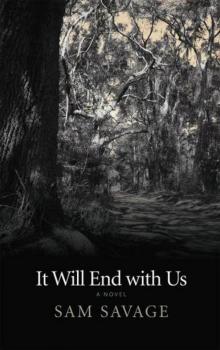 It Will End With Us
It Will End With Us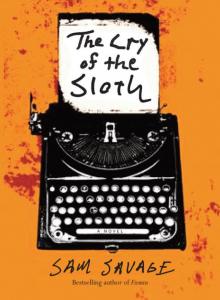 The Cry of the Sloth
The Cry of the Sloth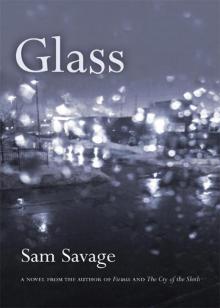 Glass
Glass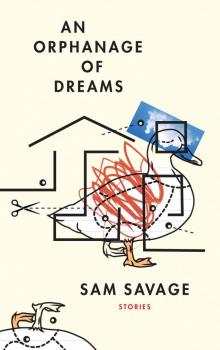 An Orphanage of Dreams
An Orphanage of Dreams Firmin
Firmin Quantum Voices
Quantum Voices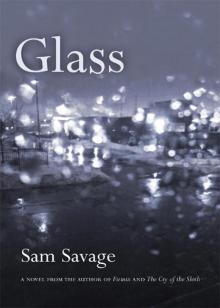 Glass (Small Press Distribution (All Titles))
Glass (Small Press Distribution (All Titles))